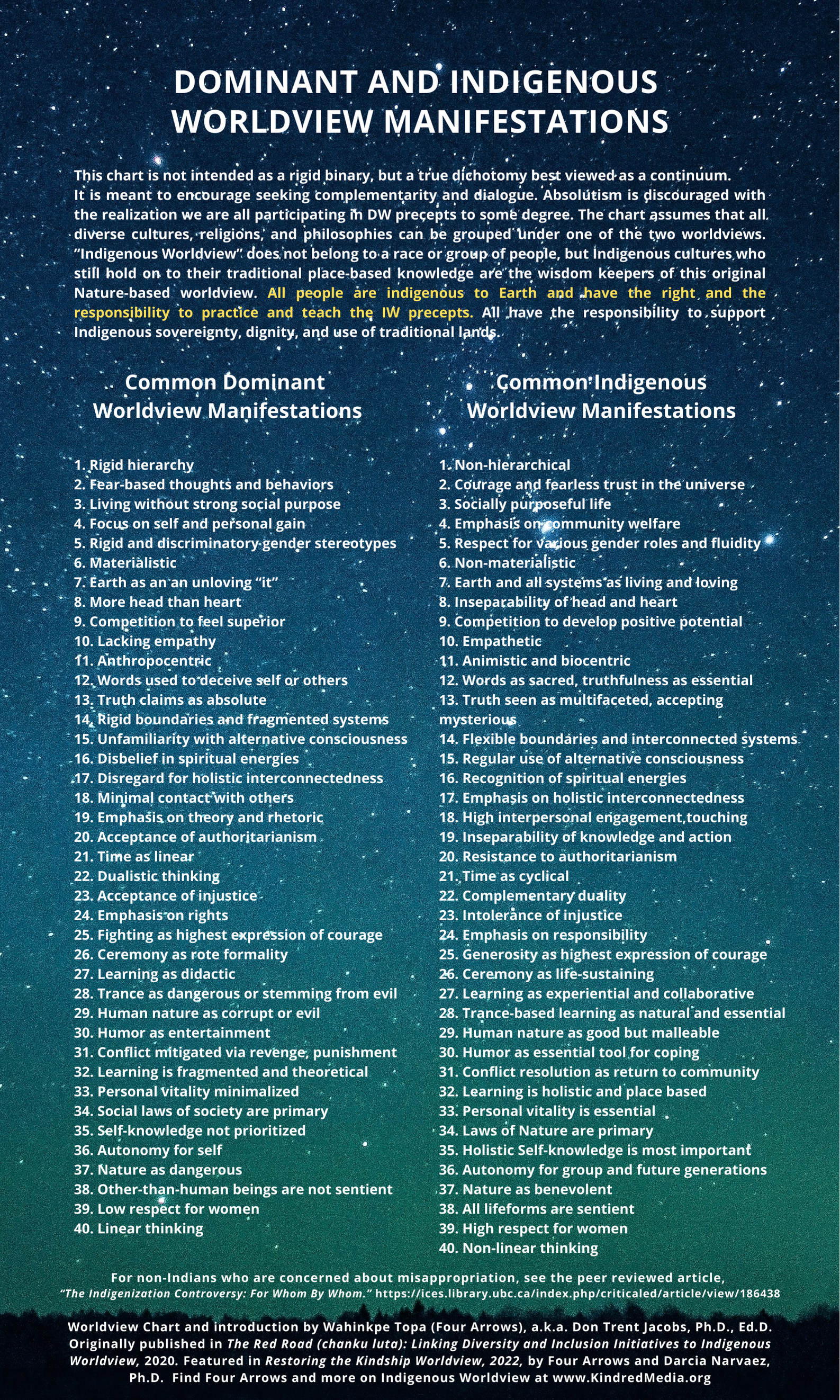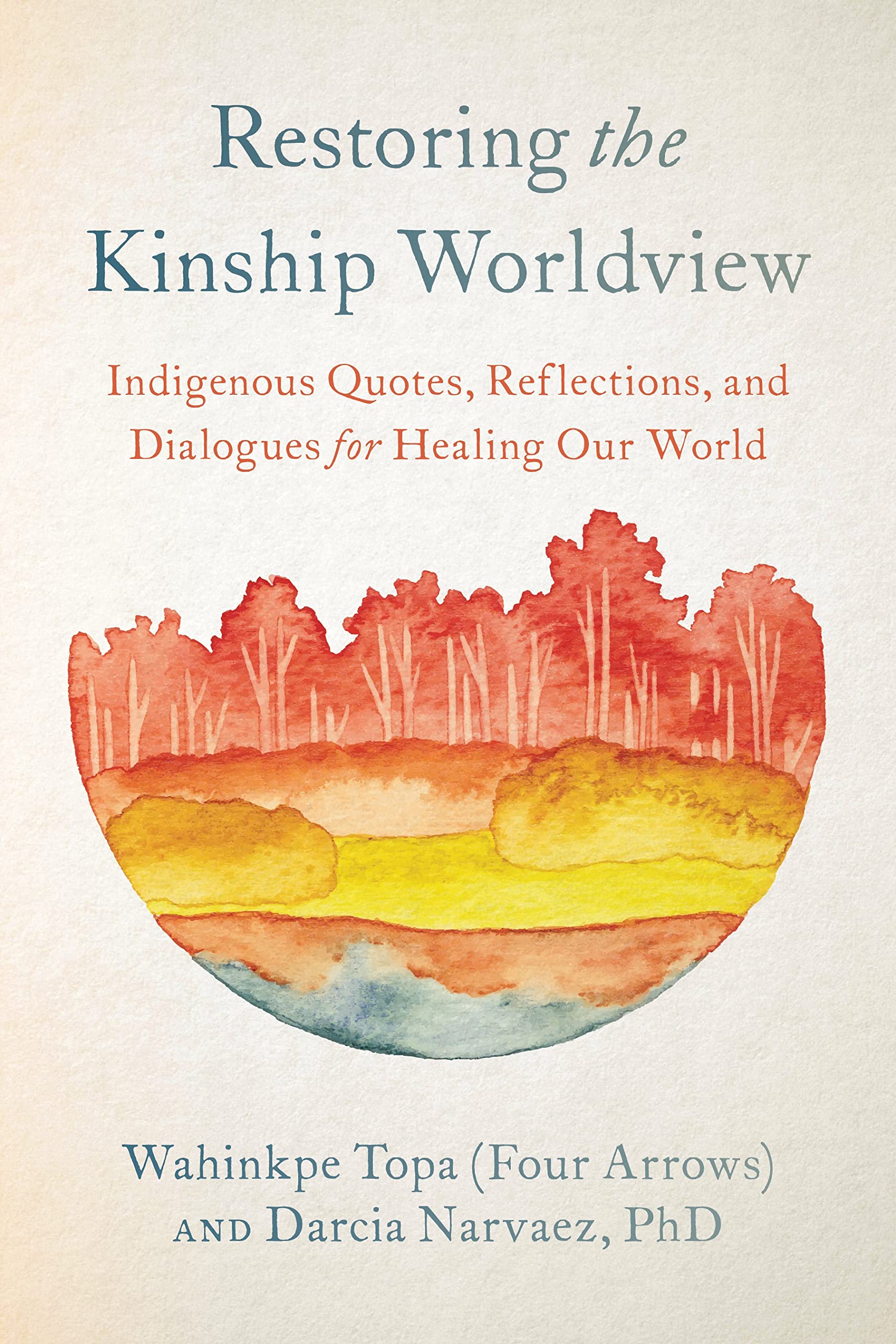Unsettling Coloniality in the Psychological Sciences by Restoring Our Kinship Worldview
Abstract
Psychology is the go-to social science for helping mitigate imbalanced mental capacity and behavior. This article shows how it is also one of the most colonized science disciplines. It explains how it contributes indirectly to or at least does little to prevent calamities like global warming, high extinction rates, pollution, sexual abuse, hate crimes, and racism. It offers that metacognitive worldview reflection that focuses on re-embracing Indigenous worldview precepts is the best way to challenge the colonial assumptions behind most psychological approaches effectively.
Listen to the Kindred interview with Four Arrows and Darcia Narvaez on their new book, Restoring the Kinship Worldview, here.
The interest in decolonizing psychology continues to increase as more people recognize how coloniality maintains social, racial, economic, and ecological injustices. However, many practitioners and educators do not realize that it cannot be done without also Indigenizing it. If they make the connection, they are often unsure about how to bring it to the table. For all branches of psychology, the goal is to critically examine both the dominant and the Indigenous (kinship) worldview precepts. (See for example the text Critical Neurophilosophy and Indigenous Wisdom.) Consider the source of the worldview precept and its potential for being causal to our global crises. For example, what effects on the world are caused by anthropocentric, hierarchical, binary and materialistic worldview precepts in contrast to animistic, egalitarian, non-binary and spiritual ones? These four contrasting worldview precepts are part of forty that can be viewed here.When studying them, try not to see them as a rigid binary, but rather as a continuum. The intention is for such worldview reflection to open dialogue, not shut it down. It is about seeking complementarity and re-balancing the foundational assumptions that ultimately guide our behaviors.
Note I speak of only two worldviews. The literature typically refers to definition of all cultural, religious and philosophical beliefs as worldviews. I submit that each of these can be grouped effectively under either the dominant or kinship worldview. This idea is supported by the pioneering worldview work of Robert Redfield. The original intention of the European term was about core assumptions about the relationship humans have with one another, with nature and with the cosmos. Redfield, considered the father of social anthropology, and his colleagues at the University of Chicago, referred to a “metropolitan” worldview that dominated the world and was continuing to erase the “primitive” one. He felt this process to be one of the greatest tragedies in human history.
Note that it is important to distinguish Indigenous worldview from Indigenous place-based knowledge. All people can learn to re-embrace the former. However, one must intimately know the local language, ceremonies and territory to practice the latter. Efforts to support surviving Indigenous cultures and their quest to protect their lands and maintain or achieve sovereignty are thus vital. The Indigenous worldview, however, belongs to all creatures who are indigenous (small “i”) to “Mother Earth.” For those who feel they do not have the right to embrace Indigenous worldview, I recommend reading “The Indigenization Controversy: For Whom By Whom.”
If psychology continues to ignore the kinship worldview that traditional Indigenous peoples and others are fighting to preserve, the outcomes will continue to be tragic. After all, psychological sciences are the “go to” for helping restore sanity and balance in human beings. Unfortunately psychology continues its colonial hegemony. In “The Self: Colonization in Psychology and Society” Kenneth J. Gergen writes “In effect with no viable or organized resistance, psychological science has achieved the capacity for full-scale colonization of the culture.” He describes targets for such resistance that include questioning and/or challenging or replacing. I propose that a study of the Indigenous and dominant worldview precepts would expose these and more, while offering solutions. I have attempted to consolidate Gergen’s ideas into the following list. Ponder how these colonized precepts fit into the dominant worldview. Then attempt to rebalance them via the Indigenous worldview with the corresponding worldview precepts. I chose some dominant worldview precepts I think are relevant to the first one as an example. Look at the corresponding kinship (Indigenous) precept on the chart and ask yourself how it could address the potential colonial problematic.
Colonized Assumptions in Psychology
- The idea that one vocabulary in psychology is accurate or superior to another, i.e. uncritical acceptance of listed disorders in the Diagnostic and Statistical Manuel of Disorders. (There are many examples of how this is colonized. I remember one example of a disordered being “talking to a rock,” something that some people do as part of the spiritual tradition.)
Possible relevant DWPs: 1. Rigid hierarchy; 8. More head than heart; 11. Anthropocentric; 12. Words used to deceive self or others; 13. Truth claims as absolute 14. Rigid boundares and fragmented systems 19. Emphasis on theory and rhetoric; 20. Acceptance of authoritarianism; 22. Dualistic thinking 34. Social laws of society are primary; 35. Self-knowledge not highest priority
- Freudian ssumptions about sexuality
- The myth of objectivity
- Relative disregard for the power of self knowledge
- Overly accepted characteristics of what can be considered as “mental illness”
- Financial and pharmaceutical influences on treatments
- Concretized language describing mental states
- Fragmentation of physical and social from mental
- Standardized language for assigning labels to symptoms
- Observing only what is included in predetermined theories
- Uncritical acceptance of what is normative
- Disregard for counter-hegemonic thinking
- Acceptance of the separation of clinical medicine, psychiatry, child psychology, educational psychology, etc.
- One size fits all thinking
- Dismissal of that which is not considered scientifically proven
- Relative disregard for self-knowledge and over-regard for psychological knowledge
- Deficit emphasis and labeling, i.e.,“I am an alcoholic”homophobic, attention deficit disorder, PTSD,
- Classifying all forms of dysfunction in terms of mental illness
- Participating in the increasing “psychologizing” of everything.
Psychology is the go-to social science for helping mitigate imbalanced behavior. This is why worldview reflection is such an important goal for people in the field. In fact, it may be that settler colonialism in psychology contributes, at least indirectly, to such extreme calamities as global warming, high extinction rates, pollution, sexual abuse, hate crimes and racism. The noted developmental psychologist Darcia Narvaez lists the following “key constructs” of psychology that make it such a potentially destructive colonizing force in the world. Each of them relates to one or more dominant worldview precepts.
Narvaez Key Colonized Constructs in Psychology
- The autonomous self has primacy. Self-oriented thinking and acting are priorities, as opposed to interdependent egalitarianism and interconnectedness with nature.
- Decontextualized, compartmentalized and quantifiable experimentation separated from relationships with others.
- Any focus on spirituality and the idea of sentience in nature is minimal or taboo.
- An emphasis on ownership and materialism as a path to happiness.
- Prioritizing individual liberty and rights over personal and social responsibility.
- Time as linear with boundaries between past, present and future that make it easy to ignore future consequences of today’s actions.
- An anthropocentric hierarchy that tends to put white male Europeans at the top
- Human nature is viewed as “fallen,” selfish, aggressive.
Arthur W. Blume adds to this list the lack of a belief in the sacredness of creation; victimization and seeking control of others. In his 2020 text, A New Psychology: An Indigenous American Perspective, he also explains how such “vestiges of colonialism have traumatized people, contributed to health disparities, and left people divided in addition to damaging the planet.”Although ignoring Indigenous worldview per se, in 2011, Howard Gardner, the famed Harvard psychologist, also made a list. Although not explicitly mentioning worldview, he did add “understanding living things and reading nature” to his original list of seven forms of multiple intelligence. He also suggested that there might also be spiritual and moral intelligence, although these did not meet his criteria for inclusion. Today, an understanding of Indigenous worldview and its proven success in human history can substantiate a spiritual and moral grounding leading a decolonized psychology.

There are few studies about the harmfulness of colonized psychological interventions that relate to individual consequences such as anxiety or depression. However, have not found any about the effect on global warming, high extinction rates, pollution, sexual abuse, hate crimes and racism. The connection has been made with religion and research exposes the effects of colonized thinking in world religions. A number of religious denominations played a significant role in colonization and imperialism throughout the world. Colonial religious institutions were responsible for those labeled as mentally ill up until the early 1900s (Dein, 2010). An extreme outcome relates to the era of witch burning, when thousands of people diagnosed as mentally ill by the Church. There are strong historical connections between religion and psychology and I propose that settler colonialism as found in organized religion applies equally to psychology. Below are some studies that correlate religion to the six extreme problems in our world. I ask the reader to think about how each can be maintained by Narvaez’s eight constructs of colonial psychology as well.
Global Warming (Climate Change)
A Pew Research Center report published in 2015 about “Religion and Views on Climate and Energy Issues” found that “When it comes to people’s beliefs about climate change, it is the religiously unaffiliated, not those who identify with a religious tradition, who are particularly likely to say the Earth is warming due to human activity.” In 2018, the Annual Review of Environment and Resources published a study about a relationship between religion and climate change. It revealed that “white U.S. Evangelicals are much less likely than other religious groups to affirm the reality of climate change or accept anthropogenic explanations for it.” (See Narvaez, # 7 and # 8).
Extinction Rates
Most religions believe in a hierarchy where humans are on top and animals are significantly on a lower rung. Some claim that God created animals for the use of humans. The Christian idea of “dominion” often meant any degree of utilitarian exploitation was sanctioned.
Britannica’s description of “anthropocentrism” offers that Anthropocentrism in most religious doctrine regards humans a separate from nature and superior to nature and holds that human life has intrinsic value while other entities (including animals, plants, mineral resources, on so on) are resources that may justifiably be exploited for the benefit of humankind.” Of course, many atheists also believe that only humans have intrinsic value and every other living things is utilitarian for use of human beings. This is the position of the self-proclaimed “Jewish/Atheist/Libertarian, Dr. Walter Block. An endowed professor of economics at Loyola, I had invited him to co-author our book, Differing Worldviews in Higher Education: Two Scholars Argue Cooperatively About Justice Education. See Narvaez, #2 and #7).
Pollution
According to Columbia Climate School’s “State of the Planet” piece on “How Religion Influences Our Relationship with the Environment” (October 15, 2020), Sirbekk, De Sherbinin and Adamo write that previous research shows religion “influences many aspects of lifestyle that affect the environment, including willingness to take actions to abate environmental degradation.” The authors refer to their study published in the Journal of Religion and Demography. In it they found that “where the religiously unaffiliated are in majority, levels of climate-change adaptive capacity are the highest. Also, the World Risk Index is lowest for the religiously unaffiliated.” They cite a U.S. survey that found an inverse relationship between religious affiliation and environmental concern and refer to other researchers who argue that individuals “who ascribe environmental change to chance or fate tend to engage less in pro-environmental behaviors.” Sherkat and Ellison (2007) report that in the U.S. conservative Protestant Christians tend to be less likely to be politically or privately involved in behaviors associated with environmental activism. Another study by Greely confirmed a previous study that found a correlation between belief in a literal interpretation of the Bible and low levels of environmental concern. Most authors studying this topic point out that all religions have some scripture advocating for care of the environment. However, the fact that there are many correlations such as these tends to support my argument that religion has been and is likely a factor in the problems relating to polluted air, water and soil. (See Narvaez, # 1, #3 and #4).
Sexual Abuse
In the 2018 collection of research articles entitled Religion and Crime: Theory, Research and Practice, edited by Kent R. Kerley, a variety of crimes are shown to be more prevalent where highly religious orientations exists. The first chapter by Denney, Kerley and Gross is on child sexual abuse within religious settings. Using faith-based insurance company records that provide coverage for 165,000 churches, Between 1987 and 2007, 7,095 claims of alleged sexual abuse by clergy, church staff, congregation members or volunteers occurred for an average of 260 claims per year. Sexual abuse in the Roman Catholic Church involved 16,000 victims and 3,700 clergy. Another chapter by Harris, Feldmee and Barranco about religious contexts and violence in immigrant destinations found evangelical adherence is positively associate with crime as relates to in-group/out-group tensions relating to immigrant settlement. (See Narvaez, #5 and #8).
Hate Crimes
In “The Manipulation of Social, Cultural and Religious Values in Socially Mediated Terrorism,” Smith et all describe how some political or terrorist groups outside the U.S. have manipulated religious values of target groups via social media to strengthen their involvement in or support for terrorism.
Other research has studied hate crimes in the United States. Ben Barka, in “Religion, Religious Fanaticism and Hate Crimes in the United States” begins his article with the definition of a hate crime by the FBI as “a criminal offense committed against a person, property, or society which is motivated in whole or in part by the offender’s bias, against a given race, religion, disability, sexual orientation or ethnicity.” Barka describes case studies he categorizes as “religious hate crimes” that emphasize religious doctrines that motivate criminal acts of violence. He writes, “By distorting the Bible and other literature, they have developed a “theology of hate” that inspires and unites the nation’s racist networks. Many perpetrators of faith-based hate crimes view themselves as “Christian soldiers,” enlisted in a universal war between the forces of good and the demonic foes of Christianity. For them, committing hate crimes is the best way to benefit from God’s redemptive power.” (See Narvaez, #2, #3, #4, #8).
Racism
There is ample research showing how the roots of racism are grounded in religions, especially in Western Christianity. This includes anti-Indigenous racism. There is also a solid research article about the role of Christianity in stifling peaceful co-existence. (See Narvaez, #2, #3, #5, #7, #8).
It is worth noting that Narvaez’s solution to the problem of colonized psychology related to her key construct list is Indigenous worldview. She is lead editor for the book Indigenous Sustainable Wisdom, and co-author of Restoring our Kinship Worldview and has specialized in studying child-rearing psychology with an emphasis on the advantages of Indigenous parenting. The research behind her work and mine is not based on romanticizing the Indigenous. Rather it is based the increasing number of studies that show how Indigenous worldview is proven solution. They counter the hegemonic anti-Indian literature that has caused us to dismiss our original nature-based worldview. (See, for example, The Dawn of Everything: A New History of Mankind or Unlearning the Language of Conquest.) As for the impact of Indigenous worldview on ecological sustainability and prevention of extinction, see the largest study of biodiversity ever undertaken. Or look for recent studies like this one about 13000 years of Aboriginal impact on the amazon rain forest. With this research in mind, I close this piece with an example of how one highly influential contributor to psychology, Abraham Maslow, suppressed his realization of the power of Indigenous kinship worldview in ways that offer a lesson for the future.
Abraham Maslow’s Hierarchy of Needs and His Blackfoot Experience
In Maslow’s unpublished essay called “Critique of Self-Actualization Theory,” written in 1966, 23 years after he published his paper on the Hierarchy of Needs, he writes “The good of other people must be invoked as well as the good for oneself. Purely inter-psychic individualist psychology without reference to other people and social conditions is not adequate.” Maslow also discovered that self-actualized people were the norm rather than the exception. He learned this from his time with the Siksika Blackfoot community in 1938, and was shocked by the realization. Maslow feared dismissal if he had publicized what he had learned from the Blackfoot teachings. Dr. Richard Katz, author of Indigenous Healing Psychology: Honoring the Wisdom of First Peoples, Harvard professor, and personal friend of Maslow’s speaks to this point in a podcast conversation with Scott Barry Kaufman (minutes 28:50–32:20). Maslow saw that for the Blackfoot, self-actualization was innate, not something rarely attained after other needs were met.
How would psychology be practiced today if Maslow’s Hierarchy of Needs showed self-actualization as inherent at birth. This is the question the authors of “Could the Bladkfoot Wisdom that Inspired Maslow Guide Us Now?” ask and attempt to answer. I offer Maslow as an example of both the potential influence of Indigenous worldview on psychology and of the difficulty most psychologists will likely have in adopting it in their practice. Maslow is one of the most influential of American psychologists. His philosophy of motivation, theory of self-actualization and hierarchy of human needs is still foundational for many who practice psychology. However, his own quotesreveal a number of colonial suppositions that continue to plague psychology. Below I cite five of his published beliefs that represent such colonized thinking. I then offer two of his published beliefs that reflect the Indigenous worldview precepts he gleaned from his six-week research project with the Blackfoot. For each I offer the worldview precepts from the chart from which it stems. I conclude with Indigenous worldview beliefs that he revealed in his unpublished work.
Maslow’s Colonized Beliefs and Corresponding Dominant Worldview Precepts
(DW=Dominant Worldview. IW = Indigenous worldview.)
- “Man is a perpetually wanting animal.” DW: Rigid hierarchy; Nature as an unloving “it;” Disregard for holistic interconnectedness; Other than humans are not sentient.
- “I should then say simply that a healthy man is primarily motivated by his needs to develop and actualize his fullest potentialities and capacities. If a man has any other basic needs in any active, chronic sense, then he is simply an unhealthy man.” DW: Living without strong social purpose; Focus on self and personal gain; More head than heart; Dualistic thinking; Emphasis on rights instead of responsibility; Social laws of society are primary; Autonomy sought in behalf of self.
- “An act is psychologically important if it contributes directly to satisfaction of basic needs.” DW=Fear-based thoughts and behaviors; Living without strong social purpose; Focus on self and personal gain; materialistic; Disbelief in spiritual entities; Absence of ceremony or seeing it as rote formality; Autonomy sought in behalf of self;
- “There are five sets of goals, which we may call basic needs. These are briefly physiological, safety, love, self-esteem and self-actualization…These are arranged in a hierarchy of prepotency.” DW=Ignorance about importance of diversity; Humor used infrequently for coping; Time as linear; Words used to deceive self; More head than heart; Focus on self and personal gain.
- “There is nothing you can do about that competitiveness. It is our nature like it is with all primates.” DW=Social laws of society of primary; Acceptance of authoritarianism; Dualistic thinking; Competition to feel superior; Rigid hiearach; Focus on self and personal gain.
Maslow’s Decolonized Beliefs (Realized from his lesson in Indigenous Worldview)
- “People who have been made secure and strong in the earliest years, tend to remain secure and strong thereafter in the face of whatever threatens.” IW: emphasis on community welfare; Empathetic; Emphasis of heart over head; Earth and all systems as living and loving; Recognition of spiritual energies; Emphasis on holistic interconnectedness; High interpersonal engagement and action; Time as cyclical; Generosity as Highest expression of courage.
- “There are the ‘strong’ people who can easily weather disagreement or opposition, who can swim against the stream of public opinion and who can stand up for the truth at great personal cost. It is just the ones who have loved and been well loved, and who have had many deep friendships who can hold out against hatred, rejection or persecution.” IW: Emphasis of responsibility over rights; Conflict resolution as return to community; human nature as good but malleable; generosity as highest expression of course; emphasis on responsibility over rights; Intolerance of injustice; Seeking complementary duality; Resistance to authoritarianism; High interpersonal enagement; Earth and all systems as living and loving; Emphasis on community welfare; Socially purposeful life.
Perhaps ending this piece with lessons from Maslow will help psychologists and people entering the field of psychology become leaders in the decolonization movement. They could help many realize “why making vital distinctions between Indigenous and dominant worldviews is not a binary thinking problem and could, in fact, save us from extinction” (Four Arrows, 2021). They could teach metacognitive worldview reflection and trance-based learning. They would be well situated to teach metacognitive worldview reflection and transformation via CAT-FAWN work. Perhaps they could even guide policies that would stop the genocide and culturecide of Indigenous Peoples.
This said, I have little hope for turning things around in the near future. Even many people bring the kinship worldview to bear on decolonizing psychology, it probably won’t be enough to change our colonized, hegemonic systems. However, I do believe that those who decide to participate in this kinship worldview transformation will be an inspiration to someone who will ultimately use what they learn to help rebuild in ways that honor the beauty and oneness of all. Meanwhile, whatever the outcome of this work may be, it is the right thing to do.





Enthralling essay that should be read by all. I read a word in a book on human anatomy last year that you might like using. The word is ‘heterarchy’. The word used in the book (titled, ‘Biotensegrity: The Structural Basis of Life’) is used to refer to all parts of the body are equal. The heart is no more, or less, vital to my existence and health than my big toe (or any other part). If we started using heterarchy is social terms, no human being, or other creature, is more, or less, important than any other.
It is a more positive way of suggesting an alternative to hierarchy than ‘anti-hierarchy’.
Keep up the brilliant, and essential, work!
Brian Donovan, M.Ed., Ph.D. (Dublin)